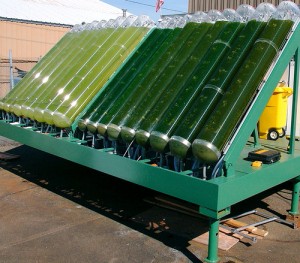
CC License Steve Jurvetson
Exxon Mobil made headlines this week by announcing that it could invest up to $600 million to scale up the production of algae-derived liquid hydrocarbon fuels. The company is teaming up with Craig Venter (of Human Genome fame) to rethink how we use biology to turn carbon into a profit-generating resource, rather than a liability in an era of global carbon pricing schemes.
Venter’s startup Synthetic Genomics Inc. is developing synthetic microorganisms to produce massive amounts of hydrocarbon chains using the energy of sunlight, hydrogen from water and carbon dioxide from power plant emissions and/or industrial waste. The algae byproduct (molecular chains of hydrogen and carbon) can be used for liquid fuels in combustion engines and/or converted into electricity via a fuel cell, or as a biomaterial feedstock used in a wide range of non-energy industries.
While it is tempting to assume this is purely a play in the ‘biofuels’ arena, a foresight-based approach to this story suggests that Exxon is dipping its toes into a new way of assembling hydrocarbon chains based on the idea of bioindustrialism. So instead of using fire (heat) to melt metals or chemicals to breakdown and reassemble molecules, visionaries are enabling an era in which biomolecular pathways do the heavy lifting of molecular assembly. This is a future in which we ‘grow’ our energy and basic materials. (Let’s not forget- oil is itself ancient algae!)
Is an Investment in Algae-based Conversion an Alternative to Oil? Or Chemical Engineering?
Exxon is in the business of finding and selling chains of hydrogen and carbon (hydrocarbons). Investing in algae could add biochemical engineering to the company’s core competency base, but it is not likely to distract the company from its primary business.
To date Exxon’s business model has been based on ‘extracting’ hydrogen-carbon molecules from the Earth as natural gas and oil. Geo-engineering is what drives its business. Then chemical engineers refine these hydrocarbon resources- then sells them as fuel for vehicles (gasoline) and power plants (natural gas) or feedstocks for materials manufacturing.
If you take away the need for oil and natural gas to be used as transportation fuel or power plants, Exxon would simply shift operations to becoming a feedstock provider for materials manufacturing. Instead of selling hydrocarbon molecules to blow up in our cars or power plants, it would arrive in the form of a plastic bag, Apple iPhone, or polymer-coated textiles.
We are not addicted to oil, as much as we are dependent on chains of carbon and hydrogen. We live in the Age of Polymers (long repeating chains of molecules). Algae offer the promise of ‘Bio-Polymer’ assembly.
Exxon’s investment places an early bet on processing molecules via algae’s biochemical pathways. The promise is low cost, scalable way to absorb carbon and produce a higher value byproduct that matches or exceeds gasoline or natural gas. This is Exxon’s first investment in a future scenario where the hydrocarbon building blocks of the world are not ‘extracted’ from geological reserves but ‘grown’ in bioreactors. There are many challenges ahead (lighting, growth factors, harvesting, et al) in scaling up bio-based energy and materials solutions, but this is a critical vote of confidence from a very conservative player in the world of energy. Most analysts expect large scale bioreactors to emerge within the next 3-10 years.
Learn more:

{ 1 trackback }